#TNG commentary
Explore tagged Tumblr posts
Text
I mean, the plan always was to kill them. Relocating them to a different planet would remove them from the radiation that’s kept them young. They would begin to age and die. Don’t act all high and mighty about not wanting to kill them, what you were doing was a death sentence as surely as destroying the planet is, just slower.
4 notes
·
View notes
Text



#heel commentator#commentator#WWE commentary#jean luc picard#tenth doctor#obi wan kenobi#picard#10th doctor#ben kenobi#star trek the next generation#doctor who#star wars#tumblr polls#polls#character polls#fandom polls#poll time#wrestling#wrestling polls#poll game#hyper specific poll#WWE#professional wrestling#pro wrestling#star trek#dr who#star wars the clone wars#st tng#dw#kenobi series
24 notes
·
View notes
Text
The Cardassian War was worse than you probably think.
I wrote a lot about the Maquis with every intention of posting quite a bit more about it, but then I got cold feet. Its actually been a while since I watched some of the critical Maquis episodes. In some instances, I haven't seen them since they aired. So I decided to go back and rewatch some of them. I started with TNG 7x20 "Journey's End." Where I expected a very strident lecture on the evils of forced relocation, I found something deeply nuanced and something that also reframed how I understood the Federation's conflict with the Cardassians.
If you're in a hurry, the big revelation was that, per Picard, millions of people died in the Cardassian - Federation War.
If you haven't been part of debates about what the scale of the Star Trek setting is or are more attuned to more recent series, millions may not actually seem that many people. Star Wars and 40k fans are probably squinting and wondering what all the fuss is about.
So let me provide some additional context. This is going to be mostly Doylist in nature, i.e. "meta" commentary.
Millions of people equals thousands of Galaxy-class starships. At a time when we'd seen not more than two Galaxy-class starships on screen at the same time and per the Next Generation Technical Manual (which was quasi-canon at the time, essentially given high regard by creatives working on Trek but always subject to being overruled if the needs of the story dictated) there could be as few as five Galaxy-class starships active at the time, but perhaps eleven including the initial batch of six and assuming the six framed out but not completed hulls were built to completion and subtracting poor Yamato.
Just a few seasons before, the loss of 39 ships and 11,000 personnel at Wolf 359 was considered a pretty devastating loss.
If it were strictly Starfleet and Cardassian military personnel, millions would be staggering losses representing the equivalent of thousands of starships or some mix of ships and major stations or ground forces. My gut tells me that given the way TNG seems to be a smaller scale setting than Trek would later be depicted, this wasn't intended to be solely military losses but also inclusive of and maybe even disproportionately falling upon civilians. Given that the Federation doesn't directly target civilians as a general rule, I do have some theories on how this might come about: namely by making space warfare messier than its generally presented: Star Wars and The Expanse have both done great representation of how conflicts that play out in space can still result in collateral damage to civilian stations and planetary settlements.
Notably, later series like DS9 and Discovery will do a "soft" retcon of Starfleet to include as many as 7,000 ships in the 23rd century and perhaps around 30,000 in the 24th century (citation: Ron Moore & extrapolation based on fleet size quotes) but while this isn't a hard retcon in that it doesn't override firmly declared facts and figures, it also doesn't seem like these larger numbers were ones TNG was operating with when it threw a mere 40 ships at the Borg or had Starfleet yet again being unable to avoid pulling ships out of dock mid-refit and stuffing Enterprise crew on them to catch the Romulans smuggling arms to House Duras.
Regardless of how the numbers breakdown, this was anything but analogous to a protracted series of border skirmishes and raids ala the colonial theaters of various European imperial wars, which full disclosure, was my working mental model for understanding this conflict.
So why does this matter for understanding the Maquis?
I think it matters for understanding the Federation's motives in signing what most fans and many in universe characters feel is a "bad" peace with the Cardassians. This wasn't a vanity war that super powers sometimes find themselves in where they'll fight for years in some corner of the globe that is strategically irrelevant to the imperial heartland but has somehow gained incredible psychological significance in the minds of defense planners, politicians, and yellow journalists. This is a conflict that cost the Federation quite a bit of blood for planets that are described as having been settled for at most a few decades and, at the very least, we've never really heard anyone from the Federation complain about a lack of satisfactory M-class planets.
Of course as represented by the North American Indians (TNG's term, not mine) that had settled on Dorvan V, from the perspective of the colonists, they had roots and distinctive cultural identities that they desired to have respected and felt warranted their own planets. From the Federation's perspective, these are people who have barely settled their worlds and one world should be as good as another. If you run the numbers through "the needs of the many outweigh the needs of the few" then this starts looking even more tilted towards the Federation's perspective.
Now the counter argument is the bog standard opposition to authoritarianism and violent revisionists argument. This is the argument that the moral responsibility for avoiding catastrophic loss of life is on the one who is the first to use violence to try to advance their interests, at least at the level of astropolitics. In this framing it is not the responsibility of the Federation to mollify the Cardassians by conceding on irrational fears or immoral demands.
A cynical reading of this argument might find within it the notion that the Federation should just do what it wants, as long as its consistent with the Federation's values, and if the Cardassians have a problem with it up to the point of attacking, then the Federation should fight back and not stop until it reaches Cardassia and overthrows the military junta in charge or at the very least, removes any Cardassian presence from Federation borders and denudes Cardassian capacity to strike across the border.
The idea here being that conceding to the Cardassians rewards them for their willingness to use violence to achieve their goals, which further incentivizes them to use violence, and arguably did incentivize them to use violence as evidenced by accusations of poisoning wells and damaging infrastructure to drive ex-Federation citizens off the worlds that were ceded to the Cardassian Union.
But this argument has always contained within it the implicit assumption that the Federation had the capacity to rollback Cardassian warmaking capability and to keep up pressure on the Cardassians until the Cardassians cry uncle. A war in which millions died and where the Federation is trading away planets is not one that seems to imply the Federation had the capacity to hammer the Cardassians until they relented or there was a deficit of will to fight this war to the hilt, recognizing that pushing the war all the way to the orbit of Cardassia Prime would result in Union space being ungoverned and insecure until the infrastructure and ships were replaced.
Anyone who has watched the outcomes of the Global War on Terror or the various civil wars and revolutions that have happened in recent years should be very cognizant that a lack of order and security often results in problems being exported to adjacent regions. Problems meaning traumatized and impoverished refugees seeking safety and sustenance in places ill equipped to provide for them materially and often with some or a lot of mutual incoherence and mistrust happening at the cultural level as norms clash. Problems also meaning unaccounted for military equipment finding its way into the hands of revolutionaries, terrorists, and pirates who pursue their own goals and survival needs through the use of weapons on anyone who has something worth taking.
The United States did not kill a million or more people in Iraq, Afghanistan, and other MENA region countries through the use of weapons from 2001 to date. Iraq from 1991 to 2001 didn't have a million excess deaths* because of bombs detonating in people's homes, those deaths resulted from damage to infrastructure and internal supply chains because civilization is actually rather fragile and even people we regard as "less developed" are not meaningfully closer to nature and more resilient than we in the WEIRD category. If anything they exist in a more delicate state because they are often living on more marginal and stressed land with infrastructure that lacks redundancies or substantial state capacity to move people and resources around quickly to address sudden need.
*It should be noted that while these figures are widely quoted, the methodology has been questioned. I would encourage readers who want to get their historical facts correct to examine the evidence and decide whether Iraq sanctions are something one wants to use in a context other than describing the potential consequences of a fictional war.
When considering how to deal with Russia and its invasion of Ukraine, there are moral debates about how hard to press the civilian economy. Namely because so much of the infrastructure and daily necessities of life in modern countries count as "dual use." As in there are legitimate civilian uses that it doesn't seem productive to deny people: transistors are essential for access to information - both state controlled but also outside channels, and operate everything from thermostats to live saving medical equipment. The distinction between a transistor appropriate for running an insulin pump and one for a hypersonic missile is increasingly blurry.
An analogy could easily be drawn to isolinear chips and replicators. We in the fandom often assume that the Federation's ability to be precise in its application of lethal violence is practically omniscient and omnipotent, and that with its august technology, it has been liberated from having to make hard decisions. Yet if the Federation wants to destroy the warmaking capability of the Cardassians, how "deep" into the Cardassian infrastructure does it need to go?
Can you imagine Captain Picard sleeping well at night after calling a senior staff meeting to debate the legitimacy of striking a fusion reactor in a dense urban area that has been unplugged from the civilian grid and hooked up to an industrial replicator pumping out photon torpedo thrusters?
Further, the moral and political science assumptions of the Federation seem to rule out the idea that Cardassian civilians suffering and dying is an appropriate form of justice for Federation lives nor does suffering seem to predictably and reliably lead to revolution. Historical evidence is at best mixed and perhaps even damning. Try wrapping your head around the idea that Russian forces continued to fight their foreign enemies in WW1 at the same time as different Russian formations were fighting each other during the civil war that broke out as a direct consequence of World War 1. In short, while the war had certainly radicalized much of the public, there was still a lot of anger and blame directed to those who had been killing Russians before Russians were killing Russians.
So what is the Federation to do?
Keep fighting a war it probably wasn't technically losing but definitely didn't seem to be winning?
And perhaps the Federation couldn't win without paying a cost in both Federation and Cardassian lives, many of whom might be noncombatants, that was unpalatable?
What was it supposed to do after Wolf 359?
Postscript:
A bit more about the plot of the episode itself. "Journey's End" is probably one of the best TNG moral dilemma episodes. There are critiques to be made obviously. That the Indigenous people depicted seem to be a bit generic to the uneducated eye and do not claim a specific tribal / national identity feels weird at the end of 2024, but it also provokes an interesting discussion about the degree to which there isn't already a lot of syncretism among peoples who have experienced massive depopulation and loss of political agency, whether through intentional genocides, loss of territory, or disease. Its not hard to imagine this "North American Indian" identity found on Dorvan V being a syncretic identity that emerged in the 2100s once interstellar colonization really took off. Its strongly implied to be a "fresh start" movement that was itself controversial and many indigenous North Americas opted not to join them; but its membership could be plausibly drawn from many cultural identities.
However, the moral dilemma at the heart of the episode is handled with exquisite care and steadfastly refuses to make anyone objectively the bad guy. Every Federation character, even hardline consequentialist Admiral Nechayev, is respectful to the people of Dorvan V and mindful of their historical trauma even as it recognizes that the Federation's own interests are largely incompatible with respecting their demands.
Even Gul Evek, the named Cardassian leader of the show, relents after an impassioned plea from Picard. Evek admits to losing two out of three sons in the war and speculates that if the Dorvan V inhabitants leave the Cardassians alone, they will be left alone. Evek was convincing at least to this member of the audience. The framing felt hopeful rather than like everyone was being asked to swallow a Targ dung sandwich.
In checking to make sure I spelled his name correctly, I've become aware that Evek becomes a recurring character and I'm intrigued to see if there are clues to be found as to whether you could argue that he was lying or that events took on a life of their own and Evek was simply proven wrong. Its possible that Dorvan V was largely spared but the Obsidian Order or other elements of the Cardassian government decided to act in places it thought the Federation wouldn't be paying as close attention and the radicalization of the Maquis in turn radicalized Evek.
After all, since that the Cardassian Union was in effect waging a proxy war in the Demilitarized Zone, it would take little to convince some Cardassians that a guerilla movement with ex-Starfleet in almost all command roles and using Federation hardware represented a Federation proxy war with top level support. Which would in turn require the Federation to at least make some efforts at combating the Maquis in order to sell the Cardassians on the idea that the Maquis are not a plausibly deniable arm of Starfleet Intelligence.
But the Maquis are obviously are going to do what they need to do to defend their worlds, whether its their actual colonies or because they object to Starfleet sitting on its hands in the face of reports of atrocities.
In retrospect, for an era that was just testing the waters for multi-season arcs, this is such smart and tragic world building. Unlike say, the plot to destroy Qonos in Discovery or the anti-Changeling bioweapon being the Chekov's gun necessary to resolve the Dominion War, very little about the Maquis arc feels contrived and much more well supported by the world building around it.
#star trek#star trek ethics#astropolitics#maquis#star trek analysis#star trek politics#fandom commentary#michael eddington#Star Trek The Next Generation#st tng#star trek tng#tng#TNG 7x20#Journey's End#cardassian war#cardassians#the trolley problem
12 notes
·
View notes
Text

Doctor Beverly Crusher @SpaceDocMom There can never be quality health care in any system that lets economic forces dictate care, be it for-profit care that pushes for what's profitable or underfunded care that allows insufficient care. You will all keep suffering until the money comes out of care entirely. emojis: black heart, blue heart, masked 12:47 PM · Oct 1, 2023
#star trek#doctor crusher#star trek the next generation#star trek memes#star trek tng#support#kindness#care#compassion#health care#healthcare#medicine#profit#economics#social justice#activism#social commentary#social issues#capitalism
67 notes
·
View notes
Text

Geordi La Forge (4x18 Identity Crisis transformed form)
"Not only is he already topless, he also glows in the dark!"
#star trek#tng#star trek tng#geordi la forge#tarchanen lifeform#<- according to the submitter. i haven't watched this episode#polls#smash or pass#queued#don't really have commentary for this one. not a look where i can decide without having watched the ep tbh
13 notes
·
View notes
Text
star trek needs to decenter the west
#okay this is simplifying star trek issues on so many levels especially its regression in what it tackles and its social commentary#like even tng had more teeth than snw and pic. (i need to rewatch disco to comment on it)#but also as much as like prodigy (haven’t finished lower decks) it’s so shallow. especially with its stance on starfleet#(i do wonder if that might change in season 2 though)#anyways.#ramblings
2 notes
·
View notes
Text
Degrassi Character Tournament

#i'm trying not to add too much commentary because my all time favorite degrassi character is in this poll (it's not snake)#and if i say anything else i'll start posting full on propaganda#degrassi#polls#poll tournament#tumblr polls#degrassi: the next generation#degrassi: tng#degrassi character tournament#bracket tournament#paige michalchuk#archie simpson
13 notes
·
View notes
Text
Anyone else really struggling with the dialogue on Picard?
#TNG I believe was specifically written in an attempt to be timeless#Nothing even remotely resembling slang#And that was a great choice because the dialogue isn’t dated even thirty years later#But that pot/marijuana thing a feed weeks ago?#Geordi saying “’geek out’?#And that time last season Picard said ‘Hey guys’?#Even aside from the other problems I have with the show#(Inconsistent exploration of/commentary on themes)#(All these grandparent-aged people having ~23-year-old kids)#(The misogynistic refusal to utilize their female characters just like in TNG)#These dialogue problems are really driving me crazy#At least drop the one-liners for fuck’s sake#(There IS a lot I like about this season don’t get me wrong)#(But I still expect better)#Star Trek PIC#PIC
6 notes
·
View notes
Text
I've got to find this bluray asap!!

The commentary from Jonathan Frakes and Marina Sirtis on the Blu-ray version of "Insurrection" is genuinely one of the funniest things I've listened to.
Highlights include:
Marina openly admitting she hasn't watched the movie since the premiere and constantly asking things like "What's that? What's he doing? What's happening?" and Jonathan just patiently explaining the entire plot to her.
“And I played Commander Riker, Picard’s big Willy.” -Jonathan introducing himself
*regarding the non-regular actors in alien makeup* Jonathan: “They didn’t know what they signed up for.” Marina: “I know, poor things.”
constant dragging of their costars throughout.
Marina: “Who’s idea was it that Patrick sing?” Jonathan: “Michael Pillar (writer)” Marina: “Really? Had he ever HEARD Patrick sing?”
"Patrick managed to get his shirt open again, he's got his guns out."- Jonathan
*regarding Worf's Klingon pimple* Marina: "What is that pimple on his face?" Jonathan: "It's a gorch, Marina! Listen to the dialogue!"
Calling Picard "Cappy", Brent Spiner "Brento", Worf "Big, dumb, stupid Worf", and F. Murray Abraham "Fmurr"
"Lookin' a little shiny there, Patrick. Was it a hot day?"- Marina
*silently watching the Son'a ship fly through space* Marina: "...Well that's not the Enterprise."
*regarding Data* “He’s so smart. He knows things.”- Jonathan
*watching Data emerge from a lake* Marina: "Why's his hair dry?" Jonathan: "He's an android." Marina: "Why's his costume dry?" Jonathan: "He's an android."
Jonathan, groaning in disgust at a scene with some children: "This is cloying."
Wheezing fits of laughter throughout
If you need a hefty dose of serotonin injected directly into your brain, I highly suggest watching this. Plus, if you listen closely, there are even some interesting tidbits about the production of the movie.
#star trek#star trek the next generation#Jonathan frakes#marina sirtis#star trek insurrection#tng#lol#funny#commentary#it was worth it tngbabe
2K notes
·
View notes
Text

I downloaded an art program for this joke.
3 notes
·
View notes
Text
Star Trek TNG S2E18: Riker is extremely horny for a space-irishwoman’s dirty feet.
#riker tng#tng s2e18#tng season 2#early tng is so bad#what am I watching#let’s explore data’s reality and what it means to be a machine with a soul#not what’s inside random sexy ladies’ skirt#am i ace or just a woman#now worf is challenging the space-irishman’s drinking skills#space irishman is sexy lady’s dad#his irishness is his main characteristic#her sexiness is hers#i should be bechdel testing this show#i think it fails hard#first watch#tng first watch#live commentary of this trash#i know the later seasons are better but my god this is a bad episode
1 note
·
View note
Text
To boldly go backwards?
Unpacking the attitudes behind people burned by Burnham. No, not those people. The other people. The ones who authentically seem to care about something other than protecting their image of Columbus as a cool dude.
This will be a series. If you’re reading this on the day it escaped my queue, the rest are queued for a 1 a day. If not, all will have the ‘Star Trek ethics’ tag in common. If I’m really on the ball, I’ll come back later and edit in links to the other chapters here.
I can see it now. Enterprise had its 1701-D cameos, Star Trek Picard had its Enterprise-G moment, and now Discovery’s finale will likely be controversial on the basis of Burnham placing the Progenitor’s technology out of reach of pretty much everyone. There will be many different ways of contemplating this, but I think you can sum it up as:
Did Discovery “give in” to techno-pessimism and in doing so undermine a core theme of Star Trek?
I don’t personally think so, but you might and I think I know why. Burnham is kind of, sort of applying a reverse Prime Directive on the Federation. She comes away believing that the Progenitor tech should not be entrusted to one person or even one civilization, and that ultimately it's unnecessary. So she “throws it away.”
By throw it away, I mean she has it yeeted into a Black Hole where theoretically more advanced civilizations than the Federation can access it if and when it comes to it, but by that point it will likely be more of an anthropological curiosity to them rather than a new technological singularity.
Thus, the series finale of Discovery is one in which some observers might feel that a core premise of Star Trek, that of techno-optimism, is betrayed. While the grousing I think is likely to be hyperbolic, not all of it is necessarily a mask for something more nasty, feral, and likely to get a person kicked off any reasonably well moderated platform if expressed in the open.
What you think the core values of Star Trek are may actually be just that: a different understanding of what the core values are, and thus a different understanding of when they have or have not been undermined. I have my own take on those values.
For instance I despise Section 31 as a concept and storytelling device, believe it has directly attacked one of the most important core conceits of the setting: its fundamental optimism, and the damage this embrace of cynicism has done is continuing to ripple through Trek into the present day.
Yet at the same time, I also understand Trek as a set of modern fables, that the Federation is not a real place, and that it has a narrative function. That function being to model becoming aware of and confronting that which we should find repugnant and unacceptable in our own society if we were not desensitized to it.
Thus Burnham’s choice is one that can be read a few different ways, and that’s without getting into whether it was satisfying as a climax. While it is often derisively referred to as “NuTrek”, a label that both describes a worldview and a storytelling style anathema to those who prefer the more professional affectations, high regard for Classical Education, and “competency porn” of TOS & TNG or the more “neo-realist” shades of gray of DS9; Discovery is in many ways a fusion of the Treks of yesteryear.
Sometimes it can be a lot closer to The Original Series in worldview than one might imagine in its willingness to indulge moral gray zones: “the Vulcan Hello” being a prime example. Other times it affirms the TNG obsession with personal and civilizational virtues as a thing one actively commits to upholding even when there are tremendous, even transformative benefits to be reaped by conceding. The refusal of the Progenitor tech being one of those examples.
This is something I’m going to unpack in subsequent posts in an attempt to try to sidestep some of the nastier fissures in the fandom and uncover what I think may be a genuine difference in the worldviews and orientations of some fans rather than, at best a distaste for the story structures and affectations of Discovery, and at its worst naked hostility to a crew that isn’t predominantly Anglo-European, heterosexual, and male.
Next: What is the Kirkian ideal?
#star trek ethics#star trek#star trek worldview#star trek discovery#star trek the next generation#star trek tng#fandom commentary#discovery finale#discovery spoilers#michael burnham
23 notes
·
View notes
Text
OK @t1gerlilly that addition is *legendary*.
You hit on some stuff that as someone who grew up with TNG as a young woman, it made me feel things that I couldn't quite put into words. You put it into words marvellously here.
My mother also made a comment about the Berman era, specifically ENT, that sums the feeling up nicely: "In TOS era, I felt welcome. I was excited by Uhura and she made me feel powerful with how respected she was. Then Rick Berman took over and it turned into a boy's club, suddenly I didn't feel welcome anymore. Women weren't shown as powerful like Uhura anymore."
I mean, wow. I never really thought of it that way. The guys on the Enterprise in TOS Prime universe didn't stand around and talk about Uhura's body, they talked of her expertise and talent. In TNG and onward, the women were constantly talked about in a demeaning way by male crew behind their backs and to their faces.
Some examples off the top of my head: The whole Barclay thing? The Tasha Yar "rape gang" planet? The ooga booga African planet with lady property which makes me crawl out of my skin every time I watch it? The women commenting on their tits getting firmer in Insurrection? Leah Brahms and Geordi? Troi knocked up by an alien against her will, or forced upon by fake Riker or young Picard clone? Bev's sex ghost? The T'Pol mind rape episode and getting her whole ass out? Garak's creepy relationship with Dukat's daughter? Dabbo girls? Ferengi's insane sexism being protected by Sisko?
Who tf was writing women in that era, 13 year old boys? Why does this era keep getting pats on the back while TOS gets lambasted? 😂 That's all I'm saying. Not that Gene or TOS was perfect, but that TNG and onward did not go out of its way to at least try to be progressive the way TOS did for women, save for some stellar examples in DS9.
I have also been reluctant to say some of these things as the Berman era has had the benefit of being remembered with rose coloured glasses. I myself am guilty of it, I remember DS9 and often give it more credit than even the creators themselves give -- they regretted they hadn't done more, and for that I applaud them. To this day I feel DS9 made as many swings as TOS did, and was true to the vision of Gene's wish to push the envelope during the time period and make commentary.
I remember watching the Borg arc air live, and for us it was some of the most exciting television we saw unfolding in history! But if we are gonna keep calling TOS on being problematic, we best be taking a long, hard look at the Berman era.
My mom grew up on TOS, I grew up on TNG. Berman's era was my era. It has such a special place in my heart, and I celebrate in TNG, DS9, VOY, and ENT. But like TOS, I'm not going to forego media literacy and make excuses for or just because I love it and it is near and dear to my heart.
Sexism in TOS: Worst Offender, or Progressive in Retrospect in Comparison?
I see a lot of folks claim that TOS was the most sexist of the Star Trek shows by a landslide -- and while I agree that it definitely suffered from the sexism of the times, I also have other perspectives to share to give some food for thought.
I am of course not insinuating that TOS isn't sexist -- it is, but I have to ask folks to consider the breadth and depth of Berman's sexism in his run and ask yourself: Was Gene Roddenberry genuinely more sexist in his storytelling and delivery than Rick Berman?
I'm not telling you to feel one way or the other, but all I ask is that you hear me out and consider some perspectives and make your own balanced assessments. Nobody is obligated to share my opinion, but it means a lot just to have folks hear it and see their thoughts on the subject. So here is what I was originally responding to:
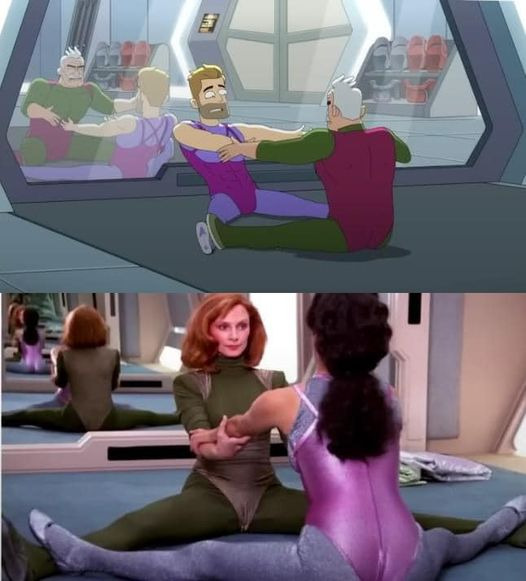
Someone's response to this photo:
"Devil's advocate. This was a part of the popular form of cardio during the production time of TNG. Yes, it was heavily sexualised by men, but so is literally every other way women work out. Men have been caught taking pictures of women while trying to do dead lifts, running on tracks and working on sled machines. They post them online to share too. The fact is, there is no way a woman can be shown working out without it going there. And yeah,t hat includes the combat forms of workout they do in Star Trek. Just look at how Dax dresses when she spars with Worf. Yes, they're dating, but still, same goes when 7 does and any other female.
Aerobics routines like this were made dirty and cringy. This was what women wore then by and large. This is how the workout was done. We make it cringy."
My response to them:
"I respect your take, but I disagree on a few fronts.
The miniskirt was chosen by the TOS female cast, not the male cast, specifically requested by Grace LW and affirmed by Nichelle and Majel who would go on to vehemently defend the miniskirt over the years as comfortable and embraced by them.
Grace said it was comfortable and seen as a symbol of female sexual empowerment during the 60s and thought it would be a progressive garment (and turns out that it was, as it was later adapted and worn by male crew as a skant on TNG) -- FYI those were designed by a gay man and Gene approved them.
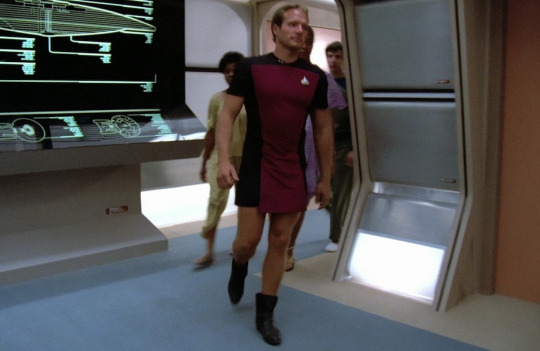
This was also supposed to be Spock's TMP outfit:
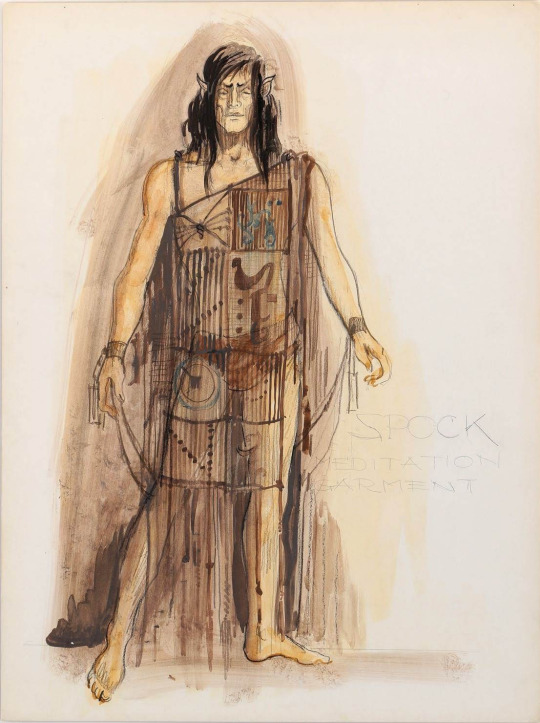
Literally lingerie.
We saw both Uhura (who saves Kirk in from Marlena Mirror Mirror) and Yeoman Landon (the first to initiate combat with a classic Kirk-esque kick to help the Captain being attacked in The Apple) carry out their combat training in their Starfleet uniforms without ever being made to change into any ridiculous workout gear.
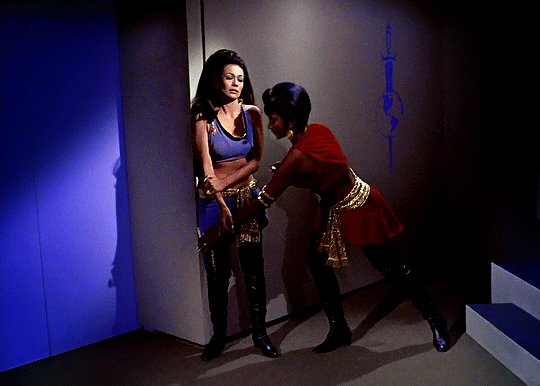


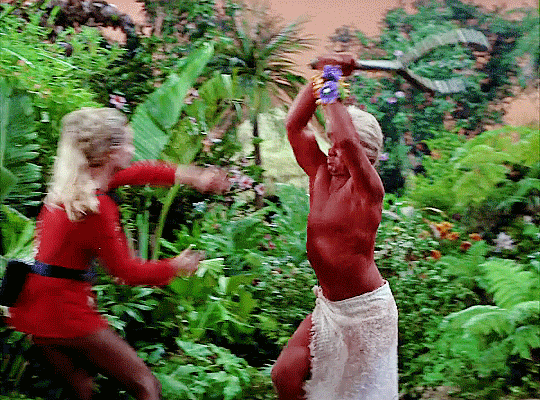
In fact, I'd argue Jim Kirk was sexualized even more than the ladies of the week on the show and I saw his naked body more than anyone else's on a fairly regular basis. He wore red yoga tights while topless in Charlie X while the women wore full length gymnastic suits that covered their entire body. If anything, it went out of its way to avoid sexualizing women practicing fitness in those scenes and instead focused on Kirk.
Gene confessed that he asked to have Shatner filmed in suggestive/provocative ways to "give something to the ladies", so he -- as he said -- liked to "film him walking away" or have him conveniently busting out of his shirts in just about every episode as it were, because Shatner apparently had great assets. LOL
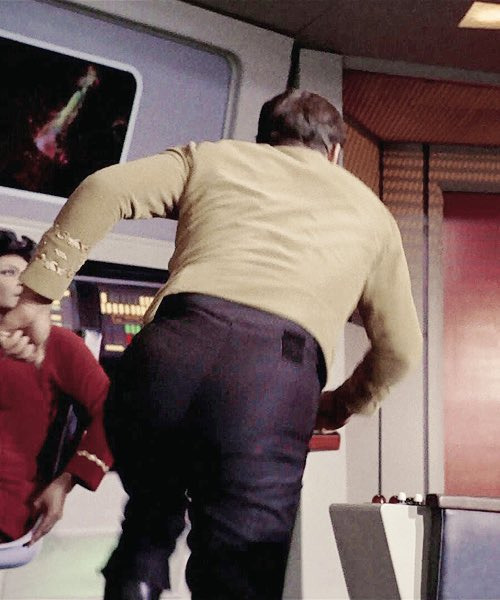
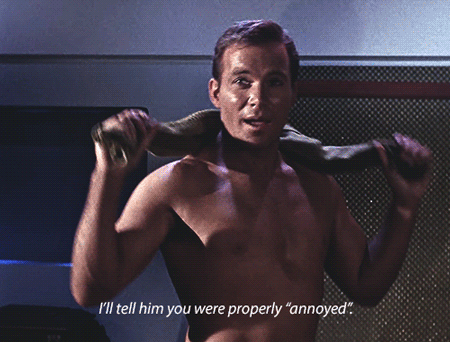
Gene made an effort to at least sexualize both if he was going to sexualize one, and he carried that attitude forward in wanting the m/m and f/f scenes in the background on Risa for TNG. He also insisted that the men and women wear skimpy outfits on THAT TNG planet. You know the one. LOL I mean the dudes even had on less than the women:
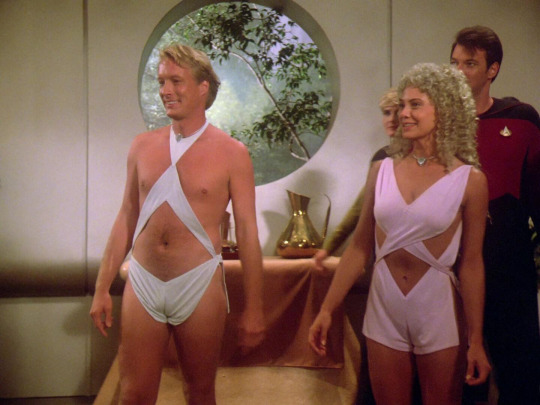
Gene also gave permission to K/S shippers to have their conventions back in the 70s when he was asked for permission. Gene and Nimoy felt with all the skimpy outfits they had the ladies wear, why not let the ladies and gay men have their fun, too? It's how we ended up with moments like this:
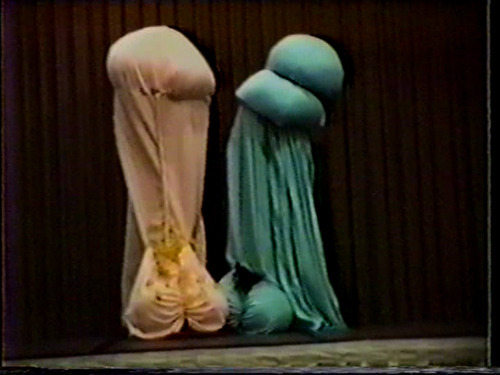
Yes, those are two people dressed up as Kirk and Spock's penises doing interpretive dance. Gene didn't give two damns. LOL
In my eyes, that was a very progressive take on Gene's part for the 60s. It was actually PARAMOUNT STUDIOS who had the big problem with K/S stories and vehemently tried to shut them down. Gene literally hired slash authors on his payroll and even had several slash stories/writers published in his official Star Trek books (The New Voyages & The New Voyages II).
I feel I saw Uhura and women in TOS engaged in more physical combat/altercations defending themselves that Troi or Bev were shown holding their own.
In fact, Kirk used to get furious when someone would "dress up" his female crew members without their consent (Trelane episode, Shore Leave episode) because like his male crew members, he wanted them to be treated professionally and to also have his male crew act professionally.
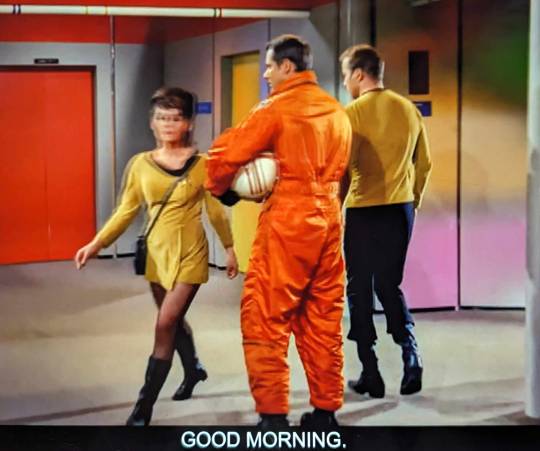
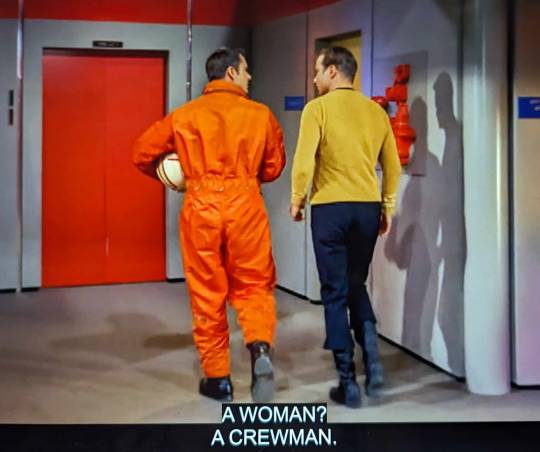
Berman brought some of his own personal biases into Star Trek that in some ways regressed it. While TOS had blatant sexism and was called on it time and again, that show was made in the 60s -- a solid 21 years before TNG. We as a modern audience understood why some of it was cringe/sexist due to the time period -- look at any other media coming out in the 60s and Star Trek was miles ahead of what other shows were doing.
Compare that to Berman who was churning sexist stuff out when women like Starbuck and Scully were simultaneously on screen on other programs airing, and we had already had Sigourney Weaver and other strong women in Holywood playing respectful roles.
In my eyes, there was no need of the sexism seen in TNG but especially VOY and ENT. There was no excuse for it when other shows were writing women far better and a number of those weren't even set in the future like Trek was, making it age even faster due to having those dated perspectives frequently highlighted.
In the Center Seat documentary as well as "The Fifty Year Mission" book you will find cast members, writers and other studio alumni who attest to this. Some discussions from "The Fifty Year Mission":
"First, Berman was supposed to have been a real sleaze ball . . . According to Terry Farrel, he would go on constantly about how her breasts weren't big enough, how she should do something about it, and how his secretary was a good example to follow as she had huge breasts. She even had to have fittings to get larger bras, and that was all done at his behest.
Later Berman and Braga developed a name for Jeri Ryan's character prior Seven of Nine. They originally called the character "perineum" which if you look it up it is the area between the anus and the scrotum. Later they floated the name "6 of 9". I mean, what does it tell you about where these two were coming from in the development of this character if they had names like that put forward in all seriousness for her?"
Gene Roddenberry also had some of his own more progressive ideas for TNG cut or watered down by Berman. Roddenberry agreed TNG should have homosexual relationships and representation at a con in the 80s and insisted on it in a meeting with his writers -- something Berman later would not honor. Gene wanted the AIDS episode, showing m/m and f/f in the Riza scenes -- these were some of Roddenberry's requests to include in TNG that Berman later stonewalled.
Berman's era was sadly dated by his own misogynist bias, IMO, to the point that it can somewhat hurt the shows he worked on through his cringe egoism and blatant disrespect toward his female cast.
There is a reason why Gene could keep female actresses working with him and Berman had a revolving door of women that he couldn't seem to keep working for him -- he was abhorrent to women, on and off set. Gene wasn't perfect at all, he had a lot of issues himself -- but Berman was a whole other level. Just look at what he did to poor Jolene Blalock, Marina Sirtis and his toxic commenting on her body weight which exacerbated her struggles with eating disorders, or how he treated and talked to Terry Farrell.
Anyway, just some food for thought. I'm not saying anyone is wrong regarding a take like that, but there are a variety of ways to look at this. Gene Roddenberry isn't a saint by any means, but it definitely bothers me how folks will tote the Berman era as if it were the lesser of two evils or the more progressive depiction of women when I felt there were far more concerning portrayals of women in his era with far less justification.
(P.S: I don't event want to go near the sheer amount of "creepy old dude/villain preys on innocent/naïve/scared young woman or little girl" stories there were in Berman's era, either. But that's a whole other can of worms I can write about in a part 2.)
#star trek tos#t1gerlilly#1shirt2shirtredshirtdeadshirt#ocstartrek#octrek#commentary#feminism#egalitarianism#sexism#mysogyny#women#double standards#star trek#star trek tng#tng#tos#ds9#star trek ds9#oc#analysis#ent#trekkie#female trekkies#octrekmeta#rick berman#gene roddenberry
4K notes
·
View notes
Text
Which Star Trek series should you start with?
The Original Series: Advantages: + The one that started it all + Has some sophisticated and socially conscious science fiction that has held up exceptionally well + The lead characters all have really good chemistry and fun to see play off of one another + It's what most people probably think of when you say Star Trek (together with TNG) Disadvantages: - It can feel very dated and kind of sexist, particularly in its treatment of women - The sci-fi and social commentary may have held up, but damn it, the special effects really haven't - When TOS is bad, it's really, really bad.
The Animated Series: Advantages: + Basically just more TOS. Disadvantages: - Basically just more TOS, but substituting extremely cheap animation for bad special effects
The Next Generation: Advantages: + Probably the most popular one at this point + The crew is full of interesting characters and they're fun to spend time with + Just really smart people solving Space Mysteries + Socialist space utopia + Geordi-And-Data! + Lots of cool sci-fi concepts and social commentary + It's what most people probably think of when you say Star Trek (together with TOS) Disadvantages: - Although not in the same way as TOS, it can feel dated at times, particularly in terms of its treatment of women and it's near complete refusal to acknowledge queerness - Without wanting to bias viewer opinion, the first season is widely considered to be pretty bad - The series makes no bones about the fact that the socialist space utopia is better than every other society that has ever existed and will reiterate this point over and over again
Deep Space Nine: Advantages: + The most popular Trek series on Tumblr + Has a complete story arc, as well as arcs for all of its characters, including the extremely minor ones + Plain, simple, Garak. The humble tailor. + Garashir, if you're into that + Seriously has a really sophisticated treatment of things like post-colonial politics, anthropology, worldbuilding, and the horrors of warfare + Just the characters in general + Is the only Star Trek prior to the 2010s to even look meaningfully at queer representation Disadvantages: - Has an absolutely massive inferiority complex with respect to TNG and this drives a few poor writing decisions that seemingly exist just to poke the Socialist Space Utopia in its eye - Introduces a space religion and then just slowly turns it into Christianity with the numbers filed off - Seems to think that sexual harassment is just a quirky eccentricity - There's no women in its writers' room, and frankly it shows
Voyager: Advantages: + Probably the clearest instance of found family in space + Lots of really good episodes + Lots of fun new characters + Strong female role models + "Set a course...for home." Disadvantages: - Continuity? I never knew her! - Probably about 90% of Trek's reputation for technobabble comes from this one series - Even less queerness than TNG. - Only like...3 characters actually get arcs. - The first few seasons lean very hard into bullshit fake "Native American" spiritualism with one of the characters - How do these guys have warp drive but can't find any water?
Enterprise: Advantages: + Chronologically the first series + 90% less technobabble + The only series to plausibly frame our heroes as astronauts...on some kind of...star trek. + Still has probably the best production values of any series + Makes alien cultures of the week feel somehow richer and deeper than other series + Faith of the Heart is good, fuck you. Disadvantages: - Oh my god, the decon scenes - Seriously, if you've ever wondered what a "sexy" series written by a 14 year old boy who's only ever seen a bit of scrambled softcore porn on late-night cable would be like, this is the show for you - Somehow feels more sexist and racist than the show from the '60s - Seriously, the POC characters mostly exist to fill seats on the bridge; the women constantly have to undress themselves - Hellooooo, Bush II-era political analogies - Scott Bakula is a good actor but you wouldn't know it from this series - In season 3, they add a tambourine beat to Faith of the Heart and ruin it
Discovery: Advantages: + Noticed the lack of queer characters in the first 50 years of Star Trek canon and decided to make up for lost time + Seriously, the "Bury Your Gays" tally for this series is like...negative two + Just incredible representation in general + Some really good science fiction plots, particularly in later series + Some really fun, memorable characters + It's still running, so it has an active fandom on Tumblr Disadvantages: - Makes Elon Musk out to be one of the great visionary geniuses of history - Not really representative of Star Trek as a whole - The series swerves wildly in tone because of constant, behind-the-scenes churn in the writers' room - Offputtingly grimdark first season - Let's be honest, none of the season-long arcs have actually had satisfying conclusions - Half the cast feels like it's just there for exposition and to be killed for cheap drama
Picard: Advantages: + Has the best dramatic acting of any Star Trek series by a fair margin + Has the best musical score of any Star Trek series + Introduces a whole crew of fascinating new characters + Introduces all kinds of fascinating transhumanist concepts + AGNES. JURATI. Disadvantages: - You know all of those fascinating new characters that I mentioned? Yeah, it unceremoniously gets rid of all of them to bring back the old TNG gang. - You know that all of those fascinating transhumanist concepts that I mentioned? Yeah, it gets rid of those too so that to give us some generic action - Oh my god, someone teach the set designers to operate a fucking light switch - Grimdark - Nossssstalgia - Each season is basically unrelated to every other season - Depends so heavily on TNG that its final season is basically unwatchable if you haven't already seen a 30-year-old TV series
Lower Decks: Advantages: + It has probably the most efficient storytelling that I've ever seen; seriously, it's incredible how much it can fit into a half hour episode + It has a bunch of delightful, archetypical characters you get to know and love + You like hanging out with these people + The ship is kind of crap and you will learn to love it that way. + Basically a sitcom version of TNG. + Has a big fandom on Tumblr Disadvantages: - The art style is pretty Rick & Morty-ish - It takes most of its first season to really strike a good balance between being a sitcom and being a Star Trek series - The main character, Mariner, is kind of unlikable for the first season or so (she gets better) - Lots of callbacks to other series (though always either incidental or clearly explained) - Given that it's the first Star Trek sitcom, the comedy is honestly kinda the weakest part? Subjective I know.
Prodigy: Advantages: + Absolutely gorgeous to look at; the most visually stunning Star Trek by quite a ways + Lots of fun new characters on a cool ship + Gives you clear on-boarding notes to the Star Trek franchise if you're watching it for the first time + Can be watched on its own, but also works as a direct sequel to Voyager and a prequel to Picard (making both of them retoractively better, in fact) + Kind of like the Clone Wars or Rebels of the Star Trek universe, I guess? + Found family in space! The next generation! + Soon to be running on Netflix, so if you already have a Netflix subscription, you don't need to pay for another service + Written for a younger audience. Not necessarily an advantage, but nice if you happen to like family friendly animation or YA. Disadvantages: - *sigh* You basically need to pirate it. Thanks, Paramount. - Has a second season that we may or may not ever actually get to see even through piracy. Thanks, Paramount. - Isn't airing on the same streaming service as all of the other ones. Thanks, Paramount
Strange New Worlds: Advantages: + Basically what the original series would be if it were released today, rather than 57 years ago; all of the cool, socially consciousness sci-fi adventure, none of the weird 60s sexism + Fun, awesome characters you get to like spending time with right away + Incredible visuals + Nifty sci-fi concepts, mostly without the 90s-style technobabble Disadvantages: - A huge cast with only ten episodes a season, so many of them feel underdeveloped - Unfortunately, a bunch of its characters are younger versions of the characters from The Original Series, and they hog most of the spotlight; and the characters whose futures aren't locked in stone are kind of treated as disposable - In general, it needs to spend less time being a prequel, and more time being its own thing - "What if Starfleet ran into the Xenomorphs from Alien?" "Well, they'd probably kill them." "Okay, let's spend several episodes on this."
857 notes
·
View notes
Text
A Story for Star Trek Day
I've told this story on Twitter before. I tell it every Star Trek Day and whenever a Deep Space 9 anniversary rolls around. It's about me and Avery Brooks (aka Best ST Captain Benjamin Sisko).
The college my mother went to specifically started recruiting top Black students in the 60s. Due to this, the Black kids all mostly knew each other as they were in that same program. Avery Brooks went to the same college and they were good friends.
(She once told me he had a huge crush on her and I was like MOM. MOTHER. WHAT. HOW COULD YOU HE COULD HAVE BEEN MY DAD.)
Anyway, many of the students in this program remained friends long after college. So over the years as Avery was getting TV gigs & such we would all watch cuz he was my mom's friend & I thought that was the coolest. There was one particularly fun night when my best friend's uncle, Frankie Faison, guest starred on A Man Called Hawk. TWO people we know on TV!
When I was in middle school Avery was touring his production of "Paul Robeson" and it came through our town, so I got to see him perform in person (awesooooome) and meet him for the first time since I was a baby (which I did not remember, of course).
Now, backing up a little bit: I am a Star Trek fan because of my mom. She loved the original series and I remember being a wee Tempest in front of the TV watching The Wrath of Khan and us excitedly going to see Star Trek IV together.
I watched TNG from the instant it appeared on TV because of her. I watched all of The Animated Series even though everyone looked "wrong". (Man... it took me 4 months to realize that dude in the red shirt was Scotty cuz I'd only ever seen movie Scotty.)
Then... they announced Deep Space 9.
We heard Avery Brooks would be the commander and there was MUCH rejoicing around our house. DS9 turned out to be the best Trek ever and, of course, Avery was awesome. This was around the time my mom dropped that "he had a crush on me but I wasn't interested" bombshell.

I'm still bitter.
I mean, I love my dad he's great. But SISKO COULD HAVE BEEN MY DAD.
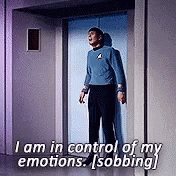
I lost my mom in 1999. She was--and I'm not exaggerating--an extraordinary woman and beloved by many. I received so many beautiful messages of condolence from her friends all the way back to those college years, including Avery. So many people remembered her fondly. <3
I kept watching Star Trek and often talked to her as if she was there during episodes. She would have LOVED Discovery. Especially since she took me to RENT the year I started college. I'm sure she would have shared my opinion of Enterprise as well. But she loved her some Scott Bakula, so she would have watched, anyway.
I got the chance to interview Avery Brooks at DragonCon back in 2013 (jeez, it's been almost 10 years omg). Before the interview, I went up to him on the Walk of Fame and I said:
Hi, I'm (name K stands for) Bradford, I don't know if you remember me...
And he looked up and said: Of course I remember you.
We talked for a bit and I asked if I could come back and interview him later and he said yes (he wasn't supposed to; his handler had A LOOK). I didn't want to hold up his line, so I said I'd see him later.
Before I could go, he reached out for my hand and squeezed it before saying: I loved your mama, you know.
And we just stayed like that for a few seconds, missing her together.
...I might have been trying very hard not to burst into tears.
That DragonCon was the last time I saw Avery. Barring an extraordinary circumstance, that's probably the last time I'll see him in person. I'm glad we got to have that moment together. And we had a great conversation!
His contribution to Trek has meant so much to me. SISKO4EVA
And I'm glad that it's another tie between me, my mom, and Trek. I can't watch DS9 without hearing her voice giving color commentary. Even the episodes she didn't live to see.
I think Star Trek is part of what gave her hope for the future. She passed that on to me. ❤️🖖🏾❤️
Happy Star Trek Day to all who celebrate.
779 notes
·
View notes
Text
Star Trek TNG 3×21 – "Hollow Pursuits"
Little commentary from someone that found themselves in Barclay and cried over this episode (I can explain myself, swear).
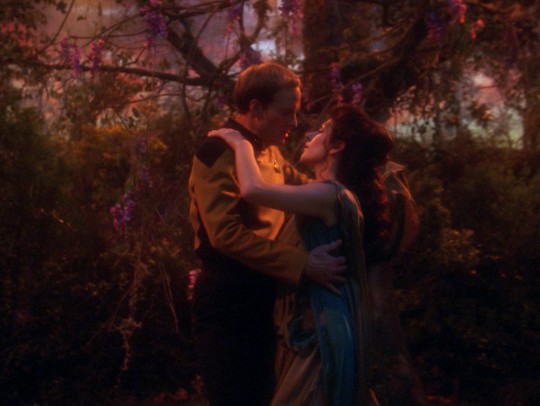
As soon as I started this episode, I disliked how Geordi spoke of Barclay – and then how literally everyone else spoke of him. Considering he hasn't done anything wrong other than be akward (and being late to work – which is something to be criticised for but that's not the biggest issue certain members of the crew have with Barclay) it felt just plain mean to me to talk about him the way they do. Especially behind his back.
Now, I don't want it to seem like I think everyone's evil and bad for being unkind to Barclay because I understand that people like him (myself included) are difficult to work and interact with. It's okay to be frustrated with the kind of person he is, but I think they were doing too much.
Also, when I started the episode, I was immediately put off by Barclay's holodeck fantasy. Not the part where he assaults LaForge and Riker – it's very common for someone to feel hatred towards their boss, I think this is just that – but more so his interaction with fake Troi. I definitely found it creepy and figured Troi would be at least uncomfortable if she were to find out. But further on in the episode I realized that that, along with beating up his superiors, is very important to understand Barclay's character. His holodeck adventures with Troi are more than just having a crush on someone and fantasizing about getting with them. Because, despite how it might be presented, the biggest focus in these scenarios is not Troi but the concept of Barclay being confident enough to get a girl and enter conflict when he deems necessary. When he's in the holodeck, alone – despite the simulations, he doesn't stutter. He's not nervous. He can relax. This is all opposite when he's at work or with Troi (the real one) because he's interacting with real, sentient people capable of judging, hating, and bullying him. And that's what's on his mind, causing him to be the way he is.
Like Guinan said: "If I felt that nobody wanted to talk to me, I'd probably be late and nervous too." (I just wanna say how much I love Guinan for everything she said to Geordi in this episode. She's genuinely very kind, and doesn't judge Barclay for being a difficult person.)
I was going to put videos just for comparison between him in the holodeck vs him in real life, with Troi, but there's a 1-video-per-post policy. Hate that. But I'll explain – in the holodeck he's easily speaking without stuttering and his movements are smooth and look effortless (he can even make eye contact with her.) Unlike him with the real Troi, where he's struggling to form a sentence and tries really hard to look relaxed and casual. It's like a Clark Kent/Superman contrast except Barclay's not faking the akwardness.
The scene after Geordi catches Barclay in the holodeck, where they're talking in Ten-Forward, was my breaking point. Barclay talks about how he's always scared of forgetting someone's name, never knows what to with his hands which causes him to always fidget nervously, how he's so terrible at social interactions he has to practice what he would talk about at a function beforehand, but when he gets there he can't find the confidence to let one word out. And then Geordi says he's "just shy" and Barclay acts as if he's been described that way a million times and it just isn't that simple. And he tells Geordi he doesn't understand, no one around him could ever understand.
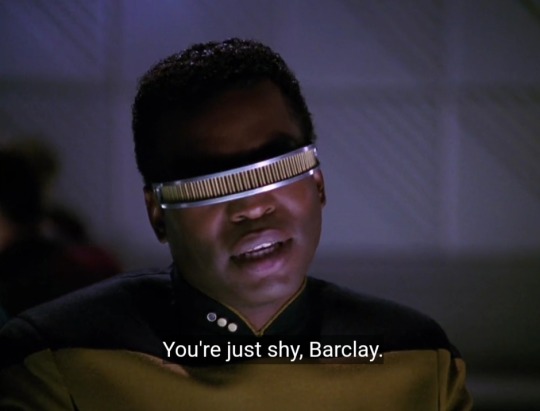
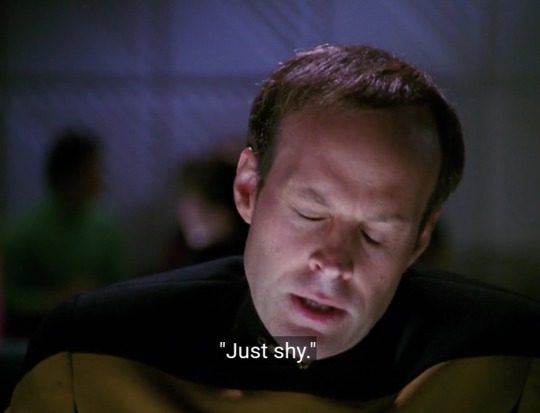
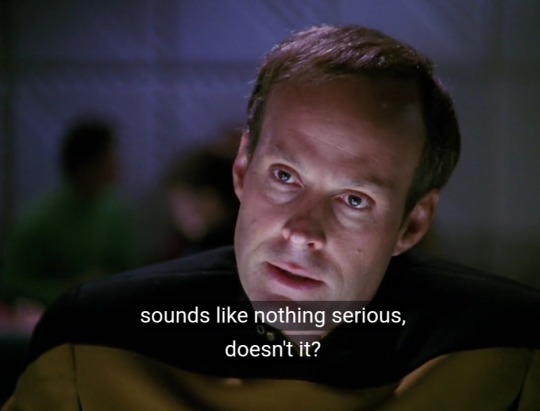
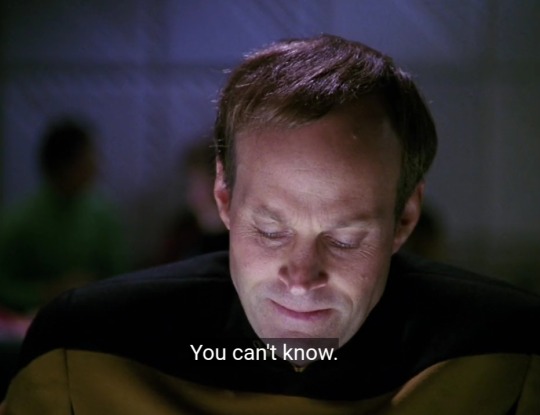

(^I just really like this piece of dialogue lol because like.... yeah man I get it)
Geordi tries (and in the end succeeds) to help Barclay be more confident. These scenes did make me cringe while watching, though. As you could guess, I'm very shy. So shy in fact that working on the Enterprise sounds like a nightmare. There's so many people and your job is so important and the consequences of messing up could be catastrophic. So, seeing Geordi bring Barclay on THE BRIDGE (aka the most important place on the ship) with THE CAPTAIN (aka the most important person on the ship) made me very nervous because I for sure wouldn't be able to handle the situation. If I were Barclay I'd be tearing up the whole time and when Picard calls me "Broccoli" I might just run to my quarters and cry so hard I throw up and scream till I pass out. I sound dramatic (and I might be) but it just really is that big of a deal for some people. But despite that, I can understand that this helps Barclay build confidence, which is exactly what he needs.
And in the end it's Barclay who saved the day. By being confident enough to voice his opinion. Something that I am very proud of him for because I still find it extremely difficult. And in the end he doesn't get a "thank you" from a superior. Geordi does, from Riker. And when Riker hears that Barclay was involved he doesn't think about thanking him as well, but it's okay. Because Geordi tells Barclay he's glad he was there to help, which is enough validation and assurance to get Barclay started. At least, it would be for me.
This is an odd episode because the main plot is that there's just this guy who's kinda weird (has social anxiety) and no one likes him. But at the same time, I really needed to watch it. For better or for worse, it felt like it was made specifically for me.
(after typing this out I found out that reg will be a recurring, and I think important, character which i am actually very glad to hear. it also means someone might care about what i have to say about him)
#if this is all over the place and doesn't make sense sorry#star trek tng#star trek#tng#star trek: the next generation#reginald barclay#geordi laforge#william riker#i dont usually do posts like these but i needed an outlet#please don't make fun of me for crying over how much i saw myself in reg#i feel so stupid for it but oh well!!!!
20 notes
·
View notes